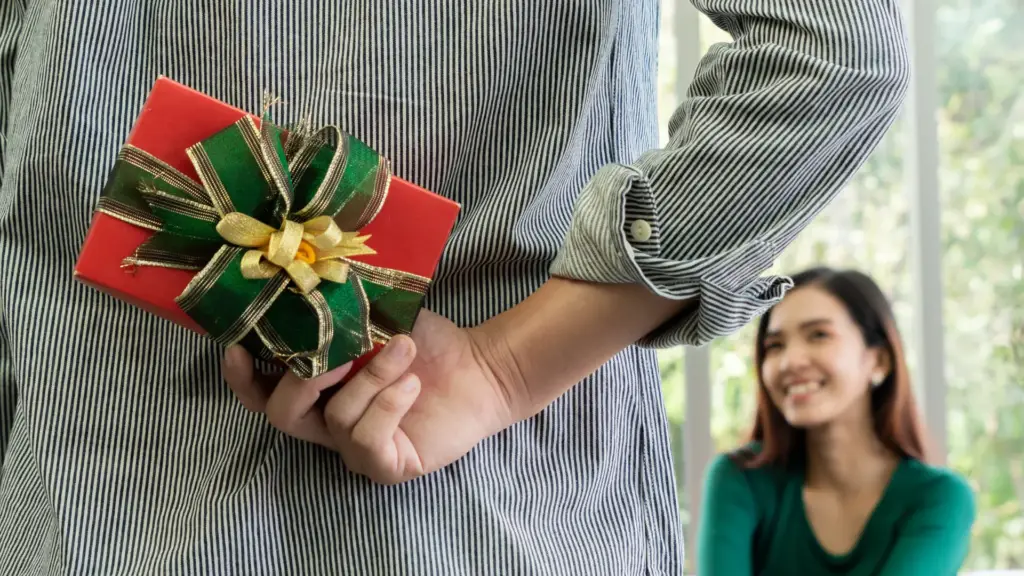
Our previous post in this series taught you how to know if your love language is words of affirmation.
Today, we are continuing our series with an article on understanding the gift giving love language. And how to ‘speak’ it with your partner.
If you missed the previous post, read about words of affirmation first to see if this is your love language.
While the others have at their core concepts which are hard to quantify or set a value for, gift giving is more materialistic in nature.
This is why many people tend to dismiss it as superficial or extravagant. Rather than acknowledging it as an expression of love.
The way we express love is instinctive and can be traced back to our childhoods. In his book, “The Five Love Languages”, Gary Chapman makes a significant observation:
Children are taught to give gifts to their parents very early on. This creates a fundamental link between giving a gift and love.
Beginning with their early years, children learn to see gifts as visual symbols of love.
That is to say that the gift giving love language isn’t all about the item being offered or received.
The actual value of gift giving lies in the gesture per se. As a way of showing that your partner has been on your mind. That the preferences they voice are heard, and that their smile is invaluable.
Why People Enjoy Gifts
As Chapman suggests, there is an innate predisposition of human beings to give to those they love.
At the same time, it is a universal expression of affection that most societies and cultures can understand and relate to.
Your partner may be naturally wired to associate feelings of love with making and/or receiving gifts.
To please someone who prioritizes the gift giving love language, you’ll need to remember all the special dates – birthdays, holidays, anniversaries – and get your lover a thoughtful trinket to celebrate the event.
Also, bear in mind that you don’t need to wait for a special occasion to celebrate and offer them a gift.
Your significant other with gift giving/receiving as a primary love language will need you to show your appreciation on a regular basis.
But before you start counting your savings, remember: it’s not the monetary value of a gift that makes it meaningful.
It’s the thought behind the gift, the expression of love and fondness that makes it a treasured keepsake.
For example, Better Topics is the perfect gift for your partner. It’s a fun card game that’s made especially for couples, helping you have more valuable and meaningful conversations.
How To Identify The Gift Giving Love Language
Do you suspect that your partner may speak the gift giving love language as a primary expression of love? Here are some pointers which will help clear out your doubts:
- Do they seem to take pleasure in shopping so much that it feels like a hobby rather than a chore?
- Do they enjoy offering gifts and put a lot of time and thought into creating memorable mementos for their loved ones?
- Do they treasure gifts they received a long time ago because of the sentimental value they hold?
- Do they collect souvenirs from every trip they go on?
- Do they have a remarkable ability to pick the perfect gift in any situation?
If this sounds like your significant other, it is safe to assume that gift giving and receiving is (one of) their primary love language(s).
Understanding how they are wired to perceive love is essential so that their expressions of affection don’t get misunderstood.
That being said, there’s more to a gift than meets the eye. If your partner speaks the gift giving love language, chances are they will cherish your gifts as sentimental keepsakes more than as material objects.
They may store concert tickets, empty chocolate boxes, dried flowers, or other unconventional tokens simply because of the emotional connection with a particular moment in your relationship.
To paraphrase Gary Chapman: the emotional love that a gift communicates is much more important than the gift itself.
How to Speak Gift Giving as a Love Language
If this is your dominant love language, knowing when or what to give your partner as a gift will come naturally.
However, if this is not the case, responding to their needs can feel like a real challenge.
But don’t panic, we have some tips which will serve as a “conversation guide” for you to speak and understand your partner’s gift giving love language.
- Really listen to your significant other. Do you know what chocolate they like most? What color would they pick to wear (or to paint the room)? What’s one thing that they’ve wanted to buy for themselves but never got around to doing it?
- Make a list of all these items and/or preferences as they are voiced and use it to make decisions when buying them a gift.
- Educate yourself to think of gift giving not in terms of material/practical value, but in terms of sentimental expression. A well timed, thoughtful trinket says “I love you” more loudly than an expensive but impersonal gift.
- Make a habit of gift giving, as opposed to using it to patch up your relationship when things are difficult. For example, a small gift offered for no reason other than to make your partner smile goes a long way. Longer than an extravagant gift meant to earn you forgiveness for a mistake you’ve made.
- In addition to gifts centered on your partner’s needs and preferences, consider strengthening your relationship with gifts centered on you as a couple. Better Topics, our card game for couples (we also have free apps to download), is a gift to your relationship. Your partner will appreciate you speaking the gift giving love language, as well as the opportunity to deepen your connection.
Is gift giving your dominant love language? We’d love to know your inside tips on what makes you tick.
Is this your partner’s primary way of expressing love? Let us know how you nurture and respond to their needs in the comments.










